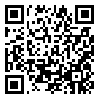Volume 1, Issue 4 (3-2019)
2019, 1(4): 0-0 |
Back to browse issues page
Download citation:
BibTeX | RIS | EndNote | Medlars | ProCite | Reference Manager | RefWorks
Send citation to:



BibTeX | RIS | EndNote | Medlars | ProCite | Reference Manager | RefWorks
Send citation to:
Shafiei E. A Comparison of Difficulties in Emotional Regulations of Patients with Mild Traumatic Brain Injury and Normal Controls. Journal title 2019; 1 (4)
URL: http://newresearch.medilam.ac.ir/article-1-325-en.html
URL: http://newresearch.medilam.ac.ir/article-1-325-en.html
Psychosocial Injuries Research Center, Ilam University of Medical sciences, Ilam, Iran
Abstract: (2884 Views)
Many individuals with traumatic brain injury experience difficulties with social behavior, some of which are attributed to
difficulties in regulation of emotions. Objectives: The aim of this study was to compare the difficulties in emotional regulations of patients
with mild traumatic brain injury (MTBI) and normal controls. Patients and Methods: In this cohort study, 72 patients with MTBI and
72 normal controls with similar gender were selected. Difficulties in Emotion Regulation Scale (DERS) and Positive and Negative Affect
Schedule (PANAS) questionnaires were completed for both the study groups at the beginning of the study and 6 months later. The data were
analyzed using multiple linear regression, Chi‑square, and paired t‑test. Results: The results showed that there was a significant difference
between MTBI patients and normal controls in all subscales 6 months after MTBI, and in the total score of DERS, except for the nonaccepted
scale and PANAS (P = 0.001), in which no significant difference was observed. In addition, the results of multivariate regression showed
that trauma (β = 0.493), age (β = −0.196), familial history of mental disorders (β = −0.185), and financial status could predict emotional
regulation (β = 0.148
difficulties in regulation of emotions. Objectives: The aim of this study was to compare the difficulties in emotional regulations of patients
with mild traumatic brain injury (MTBI) and normal controls. Patients and Methods: In this cohort study, 72 patients with MTBI and
72 normal controls with similar gender were selected. Difficulties in Emotion Regulation Scale (DERS) and Positive and Negative Affect
Schedule (PANAS) questionnaires were completed for both the study groups at the beginning of the study and 6 months later. The data were
analyzed using multiple linear regression, Chi‑square, and paired t‑test. Results: The results showed that there was a significant difference
between MTBI patients and normal controls in all subscales 6 months after MTBI, and in the total score of DERS, except for the nonaccepted
scale and PANAS (P = 0.001), in which no significant difference was observed. In addition, the results of multivariate regression showed
that trauma (β = 0.493), age (β = −0.196), familial history of mental disorders (β = −0.185), and financial status could predict emotional
regulation (β = 0.148
Keywords: Difficulties in emotional regulation, mild traumatic brain injury, positive and negative affects
: Cross sectional |
Subject:
General
Received: 2017/04/7 | Accepted: 2017/09/2 | Published: 2019/04/7
Received: 2017/04/7 | Accepted: 2017/09/2 | Published: 2019/04/7
Send email to the proposal executer
| Rights and permissions | |
 | This work is licensed under a Creative Commons Attribution-NonCommercial 4.0 International License. |






